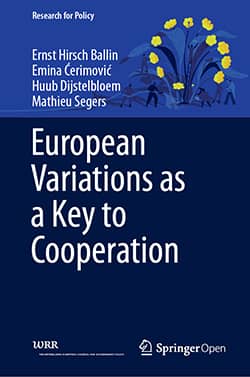European Variations as a Key to Cooperation, published by Springer and the WRR (ebook freely available here), focuses on the way in which the Member States can continue cooperating in a productive and constructive manner and the degree to which they should or should not strive to achieve uniformity in that cooperation.
Download in English: Summary of European Variations as a Key to Cooperation
Download in English: Summary of European Variations as a Key to Cooperation
Download in German: Zusammenfassung Europäische Variationen
Download in French: Résumé Variations Européennes

Image: © Springer
Fundamental question of uniformity and diversity
By accepting variation, the Union can avoid wasting energy on attaining a level of uniformity that is not really necessary. Variation makes it possible to forge credible ties with the democracies of the Member States. It offers scope and flexibility to provide collectively for public safety and security, stability, prosperity and social protection. Accepting variation as a structuring principle reduces tensions and prevents major disparities lurking beneath a show of unity from undermining the credibility of the Union.
Variation is not a sign of weakness
The book’s proposal for the Union’s development going forward emphasises variation more than has been the case thus far. Recognising and accepting variation means that differences in needs and in democratically supported convictions are taken seriously. Variation is not a sign of weakness; rather, it avoids wasting energy and political credit to attain a level of uniformity that is not really necessary. Variation can thus be a proactive means of revitalising the relationship between institutions and citizens, and between public tasks and needs.